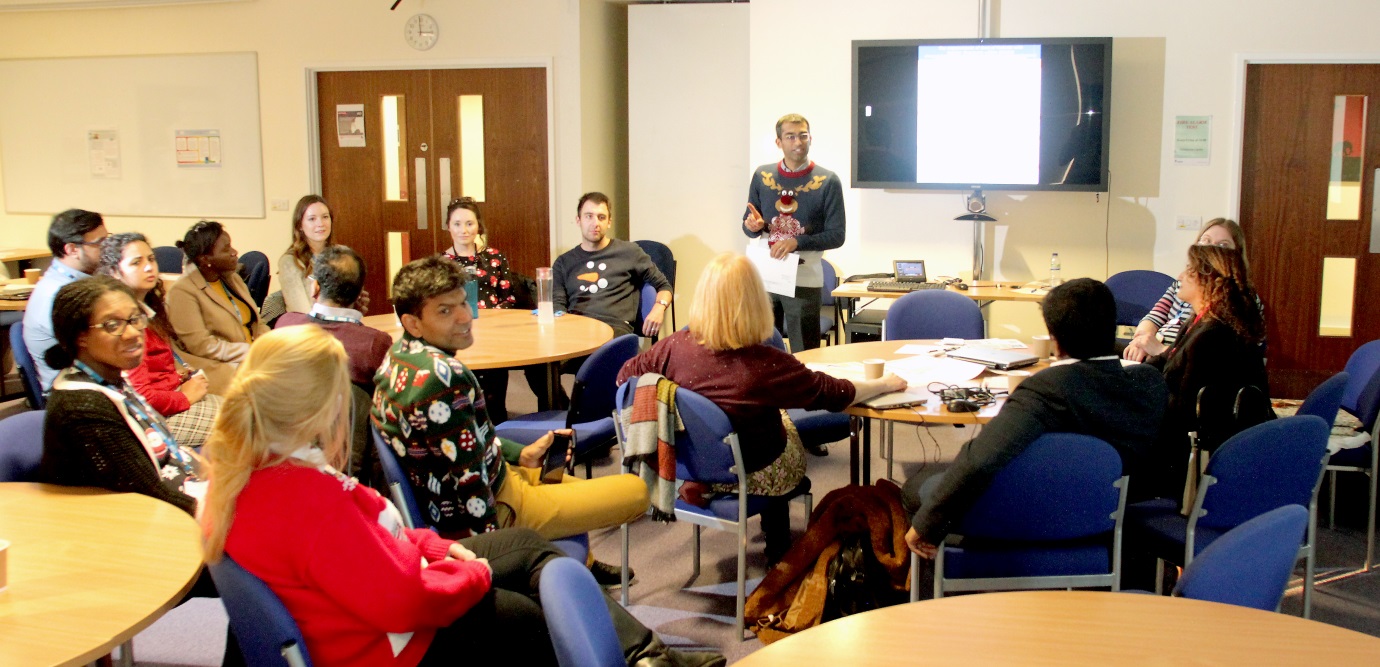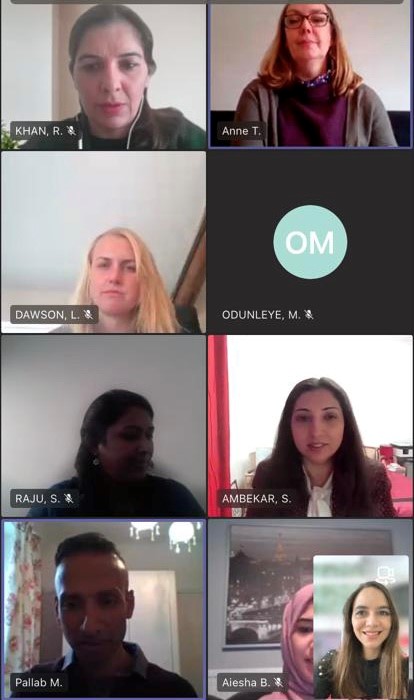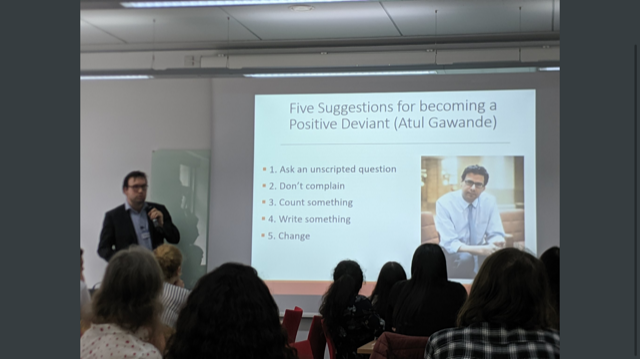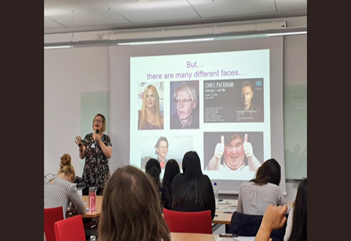Academic Teaching And Research Opportunities
Core Training
Academic Teaching
Core trainees attend the MRCPsych training course which is delivered via whole day teaching sessions once a month. This teaching is for all trainees in the East Midlands and is based for 6 months of the year in Leicester and the other 6 months in Nottingham. During the COVID 19 pandemic these teaching sessions have been delivered online. The topics of the teaching sessions cover the MRCPsych curriculum to help trainees with revision for Paper A and Paper B examinations as well as sessions focussed on communication skills training to aid preparation for the CASC examination.
Trainees also receive protected time to attend weekly case conference and journal club meetings alongside consultants, GP trainees and Foundation Doctors. Trainees are expected to present once at these meetings every 6 months which allows them to meet the case presentation and journal presentation requirements for their annual review of clinical practice. Trainees will also spend an hour in supervision with their clinical supervisor each week during which they can discuss clinical cases, complete workplace-based assessments and discuss important topics within the speciality.
Research and Quality Improvement:
Health Education East Midlands hosts a number of NIHR Academic Clinical Fellows (ACF) including fellows in Child and Adolescent Psychiatry, General Adult Psychiatry and Old Age Psychiatry. Applications for this scheme are separate from clinical core training applications, see https://www.eastmidlandsdeanery.nhs.uk/recruitment/academic. Information on integrated academic training is available from https://www.nihr.ac.uk/explore-nihr/academy-programmes/integrated-academ... more specific information on this scheme within Nottingham is available at https://www.nottingham.ac.uk/medicine/study-with-us/further-training/integrated-clinical-academic-programme.aspx and at Leicester https://www2.le.ac.uk/colleges/medbiopsych/research/clinical-academic-training. ACFs progress at the same rate as non-academic trainees but have 25% of their time ringfenced to complete research. They can balance their clinical and academic time how best suits their research e.g. some ACFs take their research days as one day a week plus an extra day per month, whereas others may take it in 3-6 month blocks of time.
Clinical core trainees who are interested in research can also make links with the University of Nottingham or University of Leicester. There is a culture within the deanery where trainees are positively encouraged to take opportunities to develop in other areas in addition to clinical practice, such as quality improvement projects both through collaboration and in developing their own projects. Trainees interested in quality improvement can also complete additional qualifications in quality improvement. There is an annual medical education conference in Nottinghamshire Healthcare at which Trainees are encouraged to present their audits, quality improvement projects and research.
Child and Adolescent Psychiatry
Academic Programme
The highly regarded academic programme for the East Midlands CAP scheme was started in Jan 2016 .The aim is to provide structured and regular teaching programme for CAP specialty trainees in the deanery. A 3 year rolling comprehensive programme is linked to the competencies outlined in the Royal College curriculum. The programme has 3 terms each year with each term consisting of 10 half-day teaching sessions. The teaching sessions are innovative and interactive and led by local and international experts. Trainees take turns in coordinating the teaching sessions, which adds to their leadership and management experience.
Academic Programme Leads:
Dr Pallab .Majumder, email: pallab.majumder@nottshc.nhs.uk
Dr Swetangi Ambekar, email: swetangi.ambekar@nhs.net
Brief and Systemic Therapy Course (BST)
CAMHS trainees in East Midlands have an opportunity to undertake a year-long course in Brief and Systemic Therapy (BST) approved by the British Psychological Society. The course is organised by Lincolnshire Partnership NHS Foundation Trust and no fee is charged to East Midlands CAP trainees. For further information see www.innovationforlearning.com/bst
Introduction to Family Therapy Course
This course is run regularly in Leicester and can be accessed by the local CAMHS trainees.
Research Opportunities
There are many research opportunities across the region with academics interested in various aspects of children’s mental health from the socio-cultural to the bio-medical.We have a strong commitment to research and teaching and work closely with Nottingham Institute of Mental Health (University of Nottingham), Greenwood Institute of Child Health (University of Leicester) and the Centre for ADHD and Neurodevelopmental Disorders Across the Lifespan (CANDAL).
Example Awards and Publications
The scheme has been awarded, following national competition, a prestigious NIHR-sponsored ACF training post at CT1/ST4 level on two occasions (2014 & 2016).
Trainees have won prestigious national and regional research awards:
- Two trainees have won the Margaret Davenport Research Prize - at the 2010 and 2011 Annual Meetings of the Child & Adolescent Psychiatry Faculty of the Royal College of Psychiatrists.
- 2011 ACAMH (Association for Child & Adolescent Mental Health) research prize – Sam Thomson: “Adolescents with a diagnosis of Anorexia Nervosa: parents' experience of recognition and deciding to seek help”
- 2011 Royal College of Psychiatrists' Morris Markowe Public Education prize - Val Yeung: “Omega 3 fatty acid supplements and dyslexia: literature review”
- 2015 Royal College of Psychiatrists' Gosling Fellowship - Puja Kochhar: “Investigating co-morbidity in children with Attention Deficit Hyperactivity Disorder and Autism Spectrum Disorder using eye tracking”
- Puja Kochhar (2012) and Meghana Kulkarni (2015) have won Institute of Mental Health Publication Prizes.
Recent and current trainees have achieved 1st author (e.g. Kulkarni et al, 2014; Thomson et al, 2014) and co-author publications (e.g. Chakrabarti, Kochhar, Marimuttu, Sorour, Telford).
Selected Publications
- Johnson S, Kochhar P, Hennessy E, Marlow N, Wolke D, Hollis C (2016) Antecedents of Attention-Deficit/Hyperactivity Disorder Symptoms in Children Born Extremely Preterm. Journal of Developmental & Behavioral Pediatrics, 37, 285-297.
- Wright N, Moldavsky M, Schneider J, Chakrabarti I, Coates J, Daley D, Kochhar P, Mills J, Sorour W, and Sayal K (2015) Pathways to Care for ADHD: A Systematic Review of Barriers and Facilitators Journal of Child Psychology and Psychiatry, 56, 598-617.
- Thomson S, Marriott M, Telford K, Law H, McLaughlin J, and Sayal K. (2014) Adolescents with a diagnosis of Anorexia Nervosa: parents' experience of recognition and deciding to seek help. Clinical Child Psychology & Psychiatry, 19, 43-57.
- Kulkarni M, Huddlestone L, Taylor A, Sayal K, and Ratschen E. (2014) A cross-sectional survey of mental health clinicians' knowledge, attitudes, and practice relating to tobacco dependence among young people with mental disorders. BMC Health Services Research, 14, #618.
- Swift KD, Hall CL, Marimuttu VJ, Redstone L, Sayal K, and Hollis C. (2013) Transition to adult mental health services for young people with Attention Deficit/Hyperactivity Disorder (ADHD): a qualitative analysis of their experiences. BMC Psychiatry, 13, #74.
Forensic Psychiatry
Academic teaching
Some example training sessions from this academic year are:
- Leadership
- An insight into Forensic CAMHS
- Medicolegal Experience
- Forensic services for deaf patients
- Peer CBD discussions
- Risk assessment
- Stalking clinic
In pre-covid times, trainees have travelled to numerous places for immersive teaching sessions, such as attending the Old Bailey, the Ministry of Justice and having joint training sessions Forensic Train
Research opportunities
Trainees may use their special interest sessions to focus on research interests.
Several Consultants within the region are actively and regularly engaged within research and keen to support trainees.
The Institute of Mental Health, based in Nottingham, is a local hub for research and offers many opportunities.
Relevant contacts are:
Dr Simon Gibbon Simon.gibbon@nottshc.nhs.uk
Dr John Tully John.Tully@nottingham.ac.uk
Psychiatry of Intellectual Disabilties
Trainees receive great benefits from the monthly Specialty Teaching Programme, owned and run by the trainees, with Consultant support. These sessions provide an opportunity for trainees to develop leadership and management skills as well as continuing professional development, peer group discussion and support. Sessions have included Dementia, Psychological approaches for people with an Intellectual and developmental disorder, Mental Health law and Makaton signs and symbols. The schedule also incorporates a Neutral Representative meeting where trainees are offered a safe space to confidentially comment on any training issues which can be shared and subsequently resolved with support from the wider specialty training committee. Trainees also attend the weekly Academic Programme within the appropriate Department, and have opportunity to teach on the MRCPsych Teaching Programme. There is protected supervision incorporated in the timetable for one hour each week. Trainees are involved in medical student education and can also become mentors as part of the PsychStart programme
Research Opportunities
Health Education East Midlands is an immensely supportive environment to train in Psychiatry of Intellectual Disability as part of Academic Clinical Fellow Posts. There is a strong research focus, and one trainee is currently undertaking a part-time PhD at the University of Leicester during their higher training, supported by the Trust and the National Institute of Health Research. Not only enjoyable but this experience has helped the trainee to develop further as both a clinician and researcher. There are also links with the Institute of Mental Health in University of Nottingham. These opportunities have led to prizes being won by trainees, such as the Alec Shapiro poster prize in 2017 and oral presentation prize in 2020. There are chances to undertake postgraduate qualifications, for example Diploma, PG certificate, Masters or MD.
Trainees are encouraged to use one of their special interest sessions each week for research, with opportunity for recruitment to multi-centre studies. This has led to Consultants and Trainees regularly publishing in peer-reviewed journals and authoring / editing key texts in the field, including the Oxford Textbook of Intellectual Disability and publishing the Frith Guidelines, the first ever national prescribing guidelines for Adults with Learning Disabilities (currently third edition), the only internationally recognised prescribing guideline in the field. There is a culture within the deanery where trainees are positively encouraged to take opportunities to develop in other areas in addition to clinical practice, such as quality improvement projects both through collaboration and in developing their own projects.



Psychotherapy
Teaching and academic opportunities
The ST role in North and South segments in general affords mutually supportive working relationships with other STs. There is a thriving peer group culture with regular peer meetings and well facilitated Balint groups. This is in addition to central Trust-organised postgraduate teaching, journal review and case discussions sessions.
There is a commitment in all of the HEE-EM Trusts to personal and team development and active medical education for trainees, and by trainees for medical students thanks to excellent dynamic links with the Medical Schools at Nottingham and Leicester.
We have found teaching opportunities to be varied – medical and nursing students, core trainee teaching, and ad hoc teaching for peers and colleagues. We are supported to facilitate Balint groups for peer STs, CTs, and GP trainees and to become involved in case supervision later on. Yamini has benefitted from experience of organising and leading teaching courses within the dynamic psychotherapy department in Leicester.
Research and Quality Improvement
While we have noticed that as a trainee the idea of research can seem a little overwhelming, due to the complexity of the work and procedures needed to vet a project through various ethics committees, it has been our experience that all the areas of HEE-EM have had excellent support from Trust R&D teams who are supportive with individual and wider projects oriented towards audit, research and QI. Of course, this figures as an item that we are mandated to fulfil in terms of training portfolio – but at the same time it makes a real difference to have trainers, colleagues and supervisors who will actively support our efforts to create research, audit and QI projects which are genuinely based on our chosen areas of interest. And, if the idea we have is not so well-formed – there is ample support on hand to help us develop the question, proposal as needed!
For her psychoanalytic research, Yamini has written a paper on infant observation linked to her external psychoanalytic training. Murat has undertaken a research/ service improvement project in which he ran a dynamically informed case and paper supervision group for the local crisis team. At the end of the two year period the research team were able to assess the benefits of such regular Balint derived workshops. Ian is involved in QI/audit to ascertain the nature, quality and uniformity of general trainees’ psychotherapy training
General Adult Psychiatry
Academic Teaching
Monthly Specialty Teaching Programme, run by the trainees, with Consultant support are of great benefit to trainees. The schedule usually incorporates a Representative meeting where trainees are offered a safe space to confidentially comment on any training issues which can be shared and subsequently resolved with support from the wider specialty training committee. Trainees also attend the weekly Academic Programme/Journal/Case club within the appropriate Department. Trainees also have the opportunity to teach on the MRCPsych Teaching Programme. Trainees will often supervise medical students during their clinical placements and facilitate aspects of their programme such as clinical task groups. There is protected supervision incorporated in the timetable for one hour each week. Trainees are involved in wider medical student education and can also become mentors as part of the PsychStart programme.
Research Opportunities
Health Education East Midlands is an immensely supportive environment to train in General adult Psychiatry as part of Academic Clinical Fellow Posts. There is a strong research focus, and trainees supported by the Trust and the National Institute of Health Research. Not only enjoyable but this experience has helped the trainee to develop further as both a clinician and researcher. There are also links with the Institute of Mental Health in University of Nottingham. There are chances to undertake postgraduate qualifications, for example Diploma, PG certificate, Masters or MD. These opportunities are not limited to Academic fellows and are open to all higher trainees. Trainees are encouraged to use one of their special interest sessions each week for research, with opportunity for recruitment to multi-centre studies. There is a culture within the deanery where trainees are positively encouraged to take opportunities to develop in other areas in addition to clinical practice, such as quality improvement projects both through collaboration and in developing their own projects. Trainees can undertake additional training in Quality improvement to help fine tune their skills and support their individual projects.
